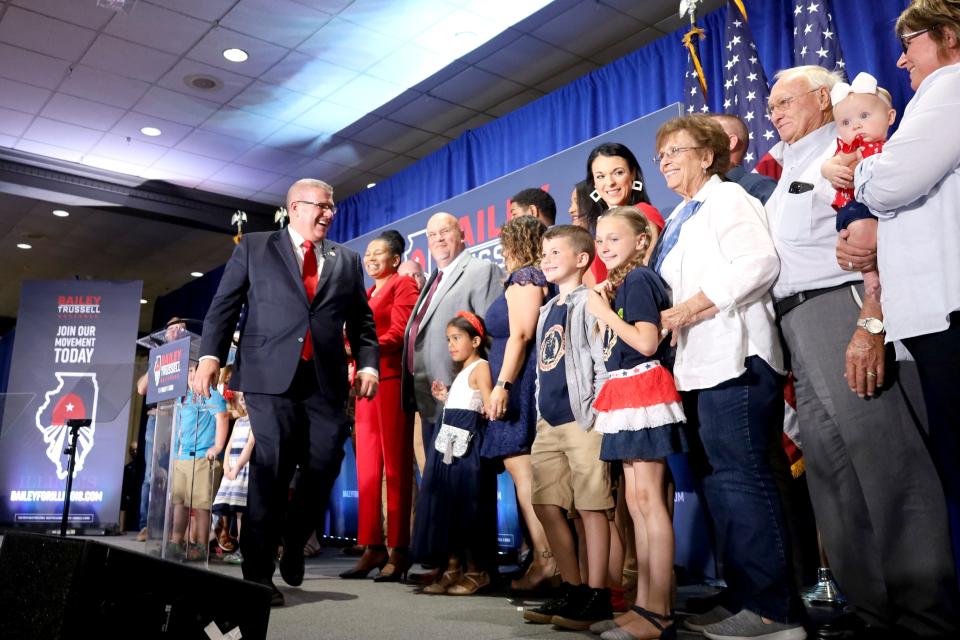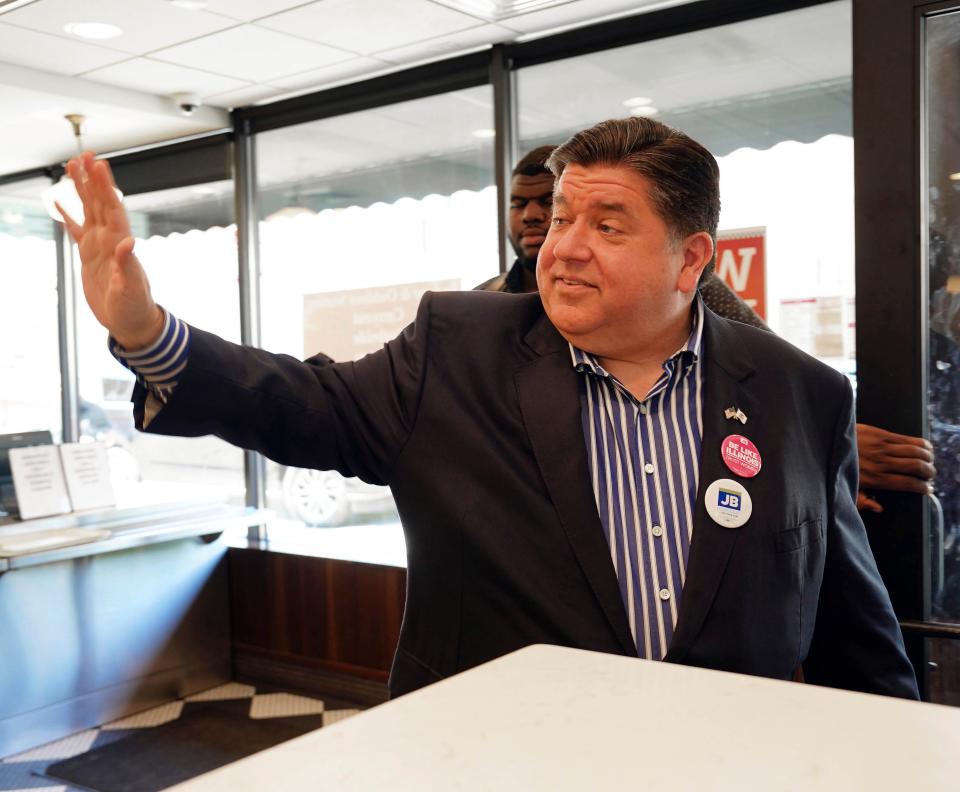Final gubernatorial debate: What do Pritzker, Bailey need to say to gain support?
- Oops!Something went wrong.Please try again later.
- Oops!Something went wrong.Please try again later.
- Oops!Something went wrong.Please try again later.
The second and final Illinois gubernatorial debate is set for Tuesday, potentially the last time that Democrat Gov. JB Pritzker and Republican challenger Darren Bailey will share a televised stage at the same time.
Recent polls indicate Pritzker has a sizable lead over Bailey, a Xenia state senator, with a possibility to win in November by similar margins to his 2018 victory over former Gov. Bruce Rauner.
Public Policy Polling conducted a poll on the behalf of the Chicago Sun-Times/WBEZ this week, which found the Democrat with a 49% to 34% lead over his opponent. In 2018, Pritzker received 54.5% of the vote compared to 38.8% going to Rauner, the Republican incumbent.
With election day now a little more than three weeks away, University of Illinois-Springfield political science professor emeritus Kent Redfield says the upcoming debate provides both candidates with an opportunity to gain, maintain or lose support.
Lies, lies, everywhere's a lie
A dominant theme in the first debate, held at Illinois State University, were claims that each candidate's respective opponents were lying or spreading mistruths.
Related:Illinois governor candidates JB Pritzker & Darren Bailey clash in first gubernatorial debate
The frequency of these claims were so high that Pritzker, when asked during a post-debate presser, said a fact check was likely in order regarding statements from Bailey.
"I couldn't correct every mistake, every lie that he was putting forward," he said.
Bailey did not speak with the media directly after the debate, but at one point during the debate said that "every word that comes out of this man's (Pritzker) mouth is a deception."
While the liar claims were abundant, how their opponent was lying was not a regular feature of the Oct. 6 debate. Much of this, Redfield says is due to the format of the prior debate — an hourlong discussion, where candidates had anywhere from 30 seconds to 90 seconds to respond to questions or statements from their opponent.
This short amount of time to respond with many topics to cover had an effect on the answers given by both Bailey and Pritzker, Redfield said.
More:Candidates for Illinois governor talk public safety at separate Tuesday events
"If you're basically dealing with 60 seconds, 30 seconds — I mean they seem to be on a pretty short clock for the first debate — it doesn't allow for a lot of nuance," he said during a Friday interview.
How the second debate plays out depends not just on the format, but also the moderators and the audience, Redfield added. The crowd was instructed to not cheer or boo the candidates during the first debate, yet it happened nonetheless — most notably when Pritzker's comments regarding balanced budgets and Bailey's comments on Amendment 1 elicited boos.
If crowd interaction continues in the second debate held in Chicago, where Pritzker primarily resides and holds a significant lead in the polls, it is possible the hometown audience could be a boost to the Democrat. The aforementioned Chicago Sun-Times/WBEZ poll found the governor with a 78% favorability compared to 12% for Bailey among polled Chicago voters.
"When you've got, particularly, a not really regulated audience, like a presidential debate, then you can start playing to the crowd," Redfield said.
Bailey's do's and don'ts
For Bailey to complete a path to victory, Redfield said the downstate farmer will need to attract more middle-of-the-road and undecided voters.
In many ways, that means shaking an image in some ways created by the Pritzker campaign in its pre-primary and post-primary ads painting him as a right-wing extremist.
One way Redfield said Bailey tried to do so in Normal was his answer to whether or not he would support an abortion ban in Illinois if it made it to his desk. Recognizing that Democrats hold super-majorities in both chambers of the Illinois General Assembly, the Republican said "nothing is going to change" to abortion access if governor.

"I couldn't change them if I could," he added.
Redfield said this position could help attract the more moderate voter, but doesn't do "anything for the enthusiasm of the pro-life voter."
This, however, does indicate the alteration of the path that Bailey has taken since the June primary.
"It's shifting," Redfield said of Bailey's messaging in the post-primary season."Pritzker did not have to shift, his primary message is the same as the general election."
Bailey and Republicans throughout the campaign have made crime a major topic of discussion, whether that be regarding gun violence in Chicago or the impacts of the SAFE-T Act and the end of cash bail. This is an area, Redfield said, that he can use for his benefit.
"Crime is something that will move voters," he said. "Pritzker wants to talk about abortion and guns, Bailey wants to talk about crime."
Pritzker's do's and don'ts
While previous incumbent Gov. Rauner lost his 2018 re-election bid, governors seeking that second, four-year term are historically successful in Illinois. Prior to the most recent election, former Democratic Gov. Daniel Walker in the 1976 primary was the last incumbent to lose such a bid.
For Pritzker to avoid joining Walker, Redfield recommends the governor stay the course — selling his accomplishments in a tenure amid the COVID-19 pandemic. Redfield said the governor's touting of his record, including such policies as the Rebuild Illinois infrastructure plan, seem to resonate with the voters within his base and perhaps moderates as well.

Pritzker's personal wealth, supporting both his campaign and attacking Bailey's, have also played a factor in shaping how voters view the candidates.
"It's hard to make Pritzker scary and Pritzker spent a ton of money trying to make Bailey scary," Redfield said, Pritzker sending $24 million to the Democratic Governor's Association before the primary to boost Bailey's support among Republicans and arguably setting up his election opponent.
"People that like Bailey like him because he is aggressive and hard-edged and charging," Redfield added. "But for people that only know Bailey through Pritzker's TV commercials, then Bailey has a problem in terms of how aggressive he is ... he also has to look gubernatorial."
How to watch the debate
Tuesday's debate will start at 7 p.m. and be held at WGN-TV studios in Chicago. The hourlong debate will be televised throughout the state and available on digital livestream as well.
Springfield viewers can tune-into WCIA-CBS (Channel 3 on Comcast), while viewers in Peoria and Rockford can catch the debate on WMBD-CBS and WQRF-FOX respectively.
Contact Patrick Keck: 312-549-9340, pkeck@gannett.com, twitter.com/@pkeckreporter
This article originally appeared on State Journal-Register: Final Illinois governor debate: What do candidates need to say?

